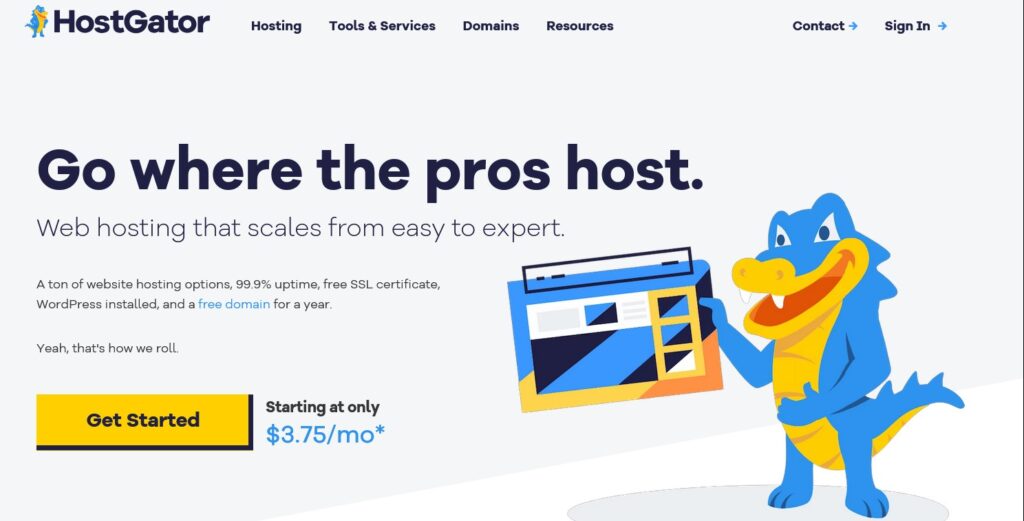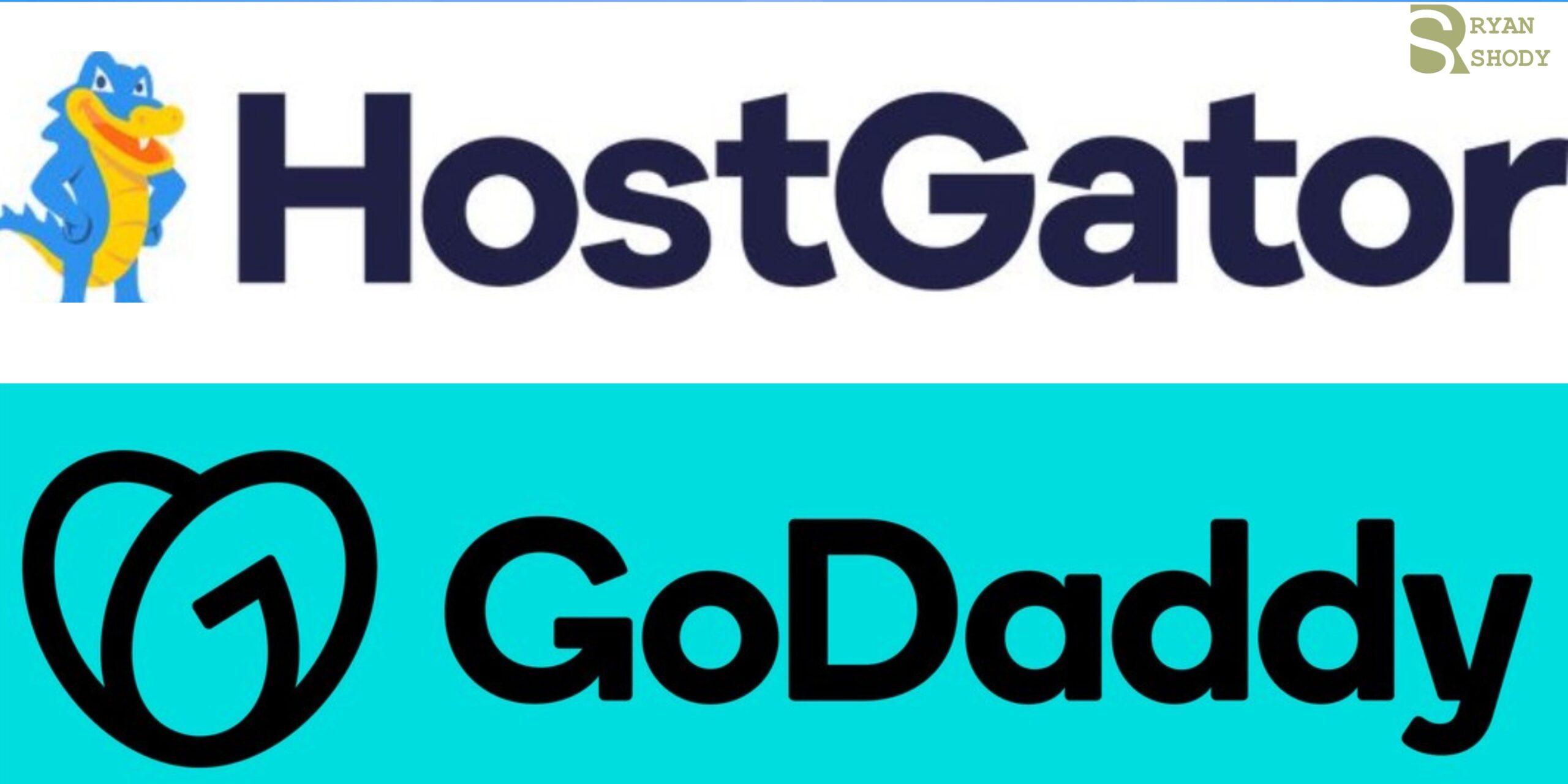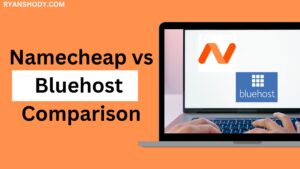When deciding between HostGator vs GoDaddy, it’s essential to understand how each web hosting provider stacks up.
Both offer unique strengths and cater to different needs, but which one truly offers the best value for small businesses in 2025?
Disclosure: This post contains affiliate links. If you click through and make a purchase, I may receive a commission at no extra cost to you. I only endorse products and services that I have personally used and genuinely recommend. Your support in using these links enables me to maintain this blog and provide detailed content free of charge to you and other readers.
In this comparison, we’ll dive into their features, pricing, and performance to help you make an informed decision.
Quick Comparison
When it comes to choosing between HostGator vs GoDaddy, the decision can be challenging due to the strengths of both providers. HostGator vs GoDaddy both offer exceptional value, but they cater to slightly different needs.
HostGator is often recommended for small businesses due to its affordable plans and easy-to-use interface, making it an excellent choice for entrepreneurs and startups.

On the other hand, GoDaddy is known for its extensive range of services and strong domain management, making it a top choice for users who want a one-stop-shop for all their online needs.

In this quick comparison of HostGator vs GoDaddy, HostGator stands out for its cost-effective plans and user-friendly interface. However, if you’re looking for a provider that offers a wide array of services beyond just web hosting, GoDaddy might be worth the extra investment. Ultimately, the best choice depends on your specific needs and budget.
Comparison Table
| Feature | HostGator | GoDaddy |
|---|---|---|
| Ease of Use | User-friendly, ideal for beginners | Intuitive interface, good for managing multiple services |
| Performance | Reliable performance with affordable pricing | Solid performance with a broader range of tools |
| Customer Support | 24/7 support via phone, chat, and ticketing | 24/7 support, plus a vast knowledge base |
| Pricing | More affordable, especially for small businesses | Competitive pricing with frequent discounts |
| Security | Basic security, free SSL certificates | Advanced security options, including backups |
| Uptime | 99.9% uptime guarantee | 99.9% uptime guarantee, highly reliable |
| Scalability | Best for small to medium-sized websites | Better for businesses looking to scale |
| Control Panel | cPanel, easy to navigate | Custom control panel with more integrated features |
| WordPress Integration | One-click installs, beginner-friendly | Optimized for WordPress, with additional features |
Feature Comparison: HostGator vs GoDaddy
When choosing a web hosting provider, the features offered by each company are crucial in making an informed decision.
In this section, we delve into a detailed comparison of the features of HostGator vs GoDaddy. Known for its affordable and user-friendly hosting solutions, HostGator is a popular choice among small businesses and startups.
On the other hand, GoDaddy is renowned for its extensive range of services and robust domain management, making it a top pick for users who need an all-in-one solution.
This HostGator vs GoDaddy features comparison is designed to help you evaluate the strengths and weaknesses of each provider, ensuring you choose the one that best meets your web hosting needs.
HostGator Features:

- Performance: Reliable performance with consistent uptime, suitable for small to medium-sized businesses.
- User Interface: Intuitive cPanel, making it easy for beginners to manage their websites.
- WordPress Integration: One-click WordPress installation, with beginner-friendly tools for easy site building.
- Domain Registration: Offers free domain registration with annual plans, reducing initial setup costs.
- Email Hosting: Free email hosting included with all plans, ideal for professional communications.
- Security: Basic security features, including free SSL certificates and automated backups.
- Customer Support: 24/7 support via phone, chat, and ticketing, with a reputation for being helpful and responsive.
GoDaddy Features:

- Performance: Solid performance with a global network of servers, ensuring fast load times.
- User Interface: Custom control panel that integrates hosting and domain management seamlessly.
- WordPress Integration: Optimized for WordPress with a variety of templates and easy customization options.
- Domain Services: Industry-leading domain management with extensive options for domain purchases and transfers.
- Email Solutions: Professional email hosting services with advanced spam filtering and security features.
- Security: Comprehensive security suite, including daily backups, malware scanning, and DDoS protection.
- Customer Support: 24/7 support with a vast knowledge base and quick response times, making it easy to resolve issues.
By comparing HostGator vs GoDaddy, it’s evident that both providers have unique strengths. HostGator is ideal for those seeking an affordable, user-friendly hosting solution, while GoDaddy excels in providing an all-encompassing service with superior domain management and security features.
Personal Experience with HostGator vs GoDaddy
Navigating the world of web hosting, my experience with HostGator and GoDaddy offered distinct advantages, each catering to different needs, particularly when considering the Best Hosting for Small Businesses.
HostGator stood out with its user-friendly interface, making it incredibly easy to set up and manage websites. This simplicity is crucial for small business owners who need Secure Web Hosting Options without spending too much time on technical details.

The customer support was reliable, with prompt and knowledgeable responses that helped resolve any issues quickly. A major highlight was the seamless integration with WordPress, which significantly simplified the process of creating and managing a website—an important factor in choosing Website Builder Reviews.
Additionally, HostGator’s features, such as free email hosting and basic security measures like SSL certificates, provided good value, particularly for those starting out with E-commerce Hosting Solutions.
On the other hand, GoDaddy impressed with its superior domain management and comprehensive security features. The speed and reliability were noticeable, especially under heavy traffic, making it a top choice for businesses needing High-Traffic Websites. GoDaddy’s customer support was exceptional, with quicker response times and more in-depth assistance, crucial for businesses seeking the Best Hosting for Small Businesses.

GoDaddy’s advanced tools, like its custom control panel and extensive domain services, enhanced the user experience, making it more efficient for users who need to manage multiple domains and hosting services in one place.
In comparing HostGator vs GoDaddy, it’s clear that both have unique strengths: HostGator excels in ease of use and affordability, making it ideal for beginners and small businesses, while GoDaddy is best for those who need comprehensive services, particularly in the context of domain management and security.
Pricing and Plans: HostGator vs GoDaddy
When considering a web hosting provider, pricing and plans are often the deciding factors. In this comparison of HostGator vs GoDaddy, we’ll explore the different pricing structures and plans offered by each to give you a clearer picture of what you can expect in terms of cost and value.
HostGator offers a range of pricing plans designed to meet various needs and budgets. From basic shared hosting to more advanced options like VPS and dedicated hosting, HostGator’s plans cater to a wide range of users.
GoDaddy, on the other hand, is known for its extensive range of services, offering competitive pricing across various hosting plans and domain services, making it an attractive option for both new users and businesses looking for a comprehensive solution.
Comparison Table of Pricing and Plans:
| Plan Type | HostGator Price | GoDaddy Price |
|---|---|---|
| Basic Shared Hosting | $2.75 – $5.25/month | $5.99 – $19.99/month |
| WordPress Hosting | $5.95 – $9.95/month | $6.99 – $12.99/month |
| VPS Hosting | $23.95 – $59.95/month | $4.99 – $99.99/month |
| Dedicated Hosting | $89.98 – $139.99/month | $129.99 – $399.99/month |
| Reseller Hosting | $19.95 – $24.95/month | $8.99 – $89.99/month |
| Domain Registration | From $12.95/year | From $11.99/year |
| Email Hosting | Free with hosting plan | $1.99/month |
Both HostGator and GoDaddy offer competitive pricing in their respective domains. HostGator provides affordable, beginner-friendly options, while GoDaddy stands out with its broad range of services, making it an ideal choice for users who need a comprehensive hosting solution.
Pros & Cons of HostGator vs GoDaddy
Understanding the advantages and disadvantages of web hosting services is crucial for making an informed decision.
In this section, we’ll delve into the pros and cons of HostGator vs GoDaddy. Each service has its unique strengths and weaknesses, and comparing them can help you determine which one aligns best with your hosting needs.
Pros of HostGator:
- Affordable Pricing: HostGator offers some of the most competitive prices in the market, especially for shared hosting.
- User-Friendly: The intuitive cPanel makes it easy for beginners to manage their sites.
- Scalability: Provides a wide range of plans, making it easy to upgrade as your site grows.
- Customer Support: 24/7 support through phone, chat, and ticketing with responsive service.
- Free Migration: Offers free website transfers for new accounts.
- Security Features: Includes free SSL certificates and automated weekly backups.
- Money-Back Guarantee: Offers a 45-day money-back guarantee, giving users ample time to test the service.
Cons of HostGator:
- Performance Issues: Occasional slowdowns during peak traffic periods.
- Upselling: Frequent upsells during the checkout process can be overwhelming.
- Limited Advanced Features: Basic plans may lack some advanced features that power users might need.
Pros of GoDaddy:
- Comprehensive Services: Offers a wide range of services beyond hosting, including domain registration, email hosting, and website building tools.
- Domain Management: Excellent domain management tools, making it easy to buy, sell, and transfer domains.
- Global Reach: Extensive global presence with data centers around the world.
- Marketing Tools: Includes marketing tools like email marketing and SEO services.
- Uptime Guarantee: Provides a 99.9% uptime guarantee, ensuring your site stays online.
- Support: 24/7 customer support with a vast knowledge base.
- One-Stop-Shop: Ideal for users looking for an all-in-one solution for their online presence.
Cons of GoDaddy:
- Higher Pricing: Some plans, especially dedicated hosting, can be more expensive than competitors.
- Additional Costs: Charges extra for features that are often included with other hosts, like backups and SSL certificates.
- Interface Complexity: The custom control panel can be confusing for users accustomed to cPanel.
- Customer Support: While available 24/7, support quality can vary, with longer response times during peak hours.
When comparing HostGator vs GoDaddy, it’s evident that HostGator excels in affordability and ease of use, making it ideal for beginners and small businesses. GoDaddy, however, shines in providing a comprehensive service suite, making it a strong choice for those who need more than just web hosting.
Alternatives to HostGator vs GoDaddy
In the dynamic web hosting market, considering alternatives to popular services like HostGator and GoDaddy is crucial for making a well-informed decision.
For those exploring website hosting solutions, it’s important to review different options that might better align with their specific hosting needs.

This section will explore noteworthy alternatives to both HostGator and GoDaddy, assessing how they stack up in terms of hosting performance, customer service, and hosting packages.
Alternatives to HostGator:
- Bluehost: Known for its strong WordPress integration and excellent customer support.
- SiteGround: Offers superior performance and advanced security features.
- DreamHost: Focuses on privacy and has a strong reputation for reliability.
- A2 Hosting: Stands out for its speed and developer-friendly environment.
- WPEngine: A top choice for managed WordPress hosting with advanced features.
- InMotion Hosting: Provides robust VPS and dedicated hosting options.
- GreenGeeks: An eco-friendly hosting provider with solid performance.
Alternatives to GoDaddy:
- Hostinger: Offers very affordable plans with good performance.
- Namecheap: Known for its budget-friendly options and domain services.
- iPage: A good choice for simple and affordable shared hosting.
- Bluehost: Balanced features and cost, with strong WordPress support.
- SiteGround: Highly regarded for its customer service and uptime.
- DreamHost: Offers easy-to-use hosting with a focus on privacy.
- HostPapa: Tailored towards small businesses with personalized support.
Exploring these alternatives to HostGator and GoDaddy offers insights into a range of web hosting options, each with unique selling points. Whether you prioritize advanced features, specialized hosting types, or budget considerations, there’s a service out there to fulfill your web hosting requirements.
Other Relevant Categories in Comparison (HostGator vs GoDaddy)
When comparing HostGator vs GoDaddy, it’s also important to consider various other categories that are crucial in the decision-making process, such as eCommerce capabilities, website scalability, and additional services like email hosting and site migration.
Categories for HostGator:
- Scalability: Excellent for businesses that anticipate growth, with a range of hosting plans.
- eCommerce Features: Offers specialized eCommerce hosting solutions.
- Shared Hosting: Affordable plans ideal for beginners and small websites.
- VPS Hosting: Flexible and scalable options for growing businesses.
- Additional Services: Includes free website migration and domain registration.
- Performance: Known for decent uptime and good speed, particularly for shared hosting.
- WordPress Optimization: Provides easy one-click installs and optimized performance.
Categories for GoDaddy:
- Comprehensive Services: Ideal for users looking for a wide range of online services, including domain management and website building.
- Ease of Use: Simple, custom-built control panel for easy management of hosting and domains.
- Domain Services: Extensive domain management and registration services.
- Security: Offers strong security features, including backups and SSL certificates.
- Customer Support: Available 24/7 with a vast knowledge base.
- Performance: Adequate for small to medium-sized websites, with a reliable uptime guarantee.
- Email Hosting: Provides professional email solutions with advanced security features.
Conclusion/Summary: Who is the Winner?
After a detailed comparison of HostGator vs GoDaddy, it’s clear that both web hosting providers have their strengths, but GoDaddy comes out on top overall. GoDaddy’s comprehensive range of services, superior domain management, and extensive customer support make it the best choice for users who prioritize an all-in-one solution with advanced features. It’s particularly well-suited for businesses, developers, and users who need a seamless experience across multiple services.
On the other hand, HostGator is the better option for beginners, small businesses, or anyone looking for an affordable, easy-to-use hosting solution with solid performance. It offers great value for those just starting out with simpler websites or blogs.
Rating for GoDaddy: 90/100%
Rating for HostGator: 90/100%
GoDaddy’s slightly higher cost is justified by the enhanced features and reliability it offers, making it the top pick for comprehensive web projects, while HostGator remains a strong contender for those on a budget or needing a more user-friendly platform.
FAQ (HostGator vs GoDaddy)
FAQ 1: What are the main differences between HostGator and GoDaddy?
Answer: The main differences lie in their pricing, performance, and target audience. HostGator tends to offer more affordable plans with good scalability, making it ideal for small businesses and beginners. GoDaddy, on the other hand, provides a more comprehensive range of services, including domain management and marketing tools, making it a strong choice for users who need an all-in-one solution.
FAQ 2: Can I transfer my existing website from GoDaddy to HostGator, or vice versa?
Answer: Yes, both HostGator and GoDaddy support website transfers. HostGator offers free website migration services, while GoDaddy provides detailed guides and support for transferring your site. It’s important to check the specifics and any associated costs before proceeding.
FAQ 3: Which hosting service is better for eCommerce websites?
Answer: For eCommerce websites, GoDaddy might be a better choice, especially with its dedicated online store plans and additional marketing tools. However, HostGator also offers solid eCommerce hosting options, particularly for those on a budget.
FAQ 4: How do HostGator and GoDaddy compare in terms of customer support?
Answer: Both providers offer 24/7 customer support, but HostGator is often praised for its responsive and knowledgeable service. GoDaddy also provides robust support but has a broader range of support resources, including a large knowledge base and community forums.
FAQ 5: Are there any significant differences in security features between HostGator and GoDaddy?
Answer: Yes, there are differences. HostGator offers basic security features, including free SSL certificates and automated backups, while GoDaddy provides more comprehensive security options, including daily backups, malware scanning, and advanced SSL certificates.




